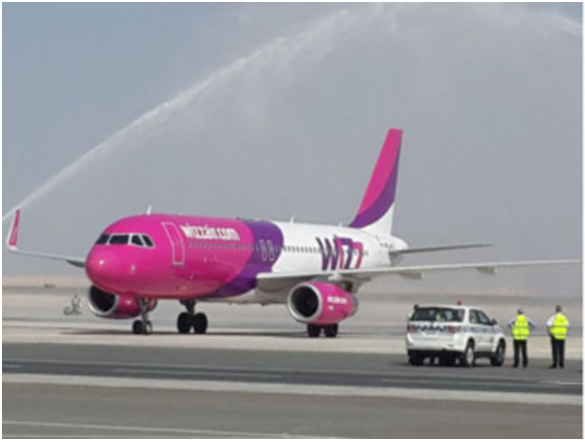Wizz Air, Air Arabia Abu Dhabi services can drastically bring down rates on key routes
Dubai: Fancy a flight to a destination in Europe for Dh300-Dh400? The UAE’s newest airline, Wizz Air Abu Dhabi, is holding out that promise… provided you are not carrying anything beyond the hand luggage.
The airline, now rescheduled to launch services from October 16, and another recent entrant, Air Arabia Abu Dhabi, will significantly alter the rate dynamics on key sectors. Air Arabia Abu Dhabi on Monday announced that it will be adding a third destination – Cairo – to its Egypt schedule later this month, and industry sources say it has already started to make an impression on ticket rates.
Wizz Air Abu Dhabi, a joint venture between Abu Dhabi’s investment giant ADQ and Wizz Air of Hungary, issues a basic ticket within the Dh300-Dh400 range as per its website. That is one-tenth of those charged by UAE’s flagship airlines for their less expensive seats.
Even Wizz Air’s more expensive deals like Wizz Plus & Flex, which allows travelers to carry up to 32 kilogram of baggage, is priced lower than what other airlines are offering for the same routes.
According to numbers provided by Al Tayer Travel, a one-way ticket to Budapest will cost Dh1,050 by Wizz Air, while Etihad and Emirates charge Dh3,250 and Dh3,000, respectively, to fly to the Hungarian capital.
A trip to Athens, and home to several heritage sites, will cost Dh1,100 on Wizz Air, compared to Dh3,080 on Emirates. To fly to Bulgaria’s capital Sofia, Wizz Air fares are Dh850 cheaper than what budget carrier flydubai is offering.
“We haven’t started seeing bookings for Wizz Air yet,” said a spokesperson for Al Tayer Travel. “We are expecting bookings to pour in from September 15 onwards due to the low ticket prices.”
Ultra-competitive
The addition of these two airlines – Air Arabia Abu Dhabi launched July 14 – should make for interesting changes to the airline dynamics in the UAE. More so now as the industry tries to regain its footing after a horrific six months trying to cope with the pandemic fallout. Even the most optimistic forecasts suggest it could be 2024 before air travel gets back to pre-COVID-19 levels.
It is into this space that Wizz Air and Air Arabia Abu Dhabi are flying into. The next round of route additions will have a significant say in setting their prospects.
“The secret is to sell volume – at a good price,” said Andrew Charlton, an aviation analyst. “Most aviation costs are fixed – so as long as they are covered there is scope to succeed. That said, the second-half of the equation is to keep costs as low as possible… that is a tried and true playbook.”
Follow the European model
Wizz Air will be using the script that brought it so much success as a low-cost carrier in Europe. After flights resumed, its flights have been averaging 70-80 per cent capacity – and well over the rest of the industry.
“Wizz bases its model on lower fares that attract price-sensitive customers,” said John Strickland, Director of JLS Consulting. “These are frequently younger travelers.”
Some mix and match
For its Abu Dhabi services, the demographics might change, but one factor will remain constant – selling tickets at the lowest possible rates. And if it were to add routes to London and other prime destinations from Abu Dhabi, it will have a lot going for it.
So far, Wizz Air has announced twice weekly flights to Kutaisi, Odesa, Larnaca and Yerevan. The airline will be flying to Alexandria and Athens thrice in a week.
Carrier of disruption
Its entry is also expected to disrupt the market for low-cost carriers in the UAE. The airline will launch with two Airbus A321 Neo aircraft, before growing its fleet in Abu Dhabi to six planes in the first six months of operations.
“History tells us that the “normal” fare afterwards will not be as high as it was before the arrival of low-cost carriers,” said Charlton. “But yes, there will be a regression to a new normal [that is] lower than current rates if history is any guide.”
As such, airfares from the UAE to destinations across Europe and Asia are expected to fall as countries ease up on COVID-19 measures and airlines offer deep discounts to win back travellers.
This has already been demonstrated in China, where average fares were down 33 per cent year-on-year in July, according to International Air Transport Association (IATA).
“That is helping to stimulate the growth that we’ve that we’ve seen – [but it’s] less so in other markets,” said Brian Pearce, IATA’s Chief Economist during a recent conference call.




